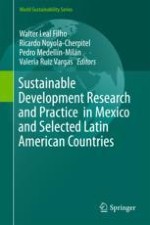2018 | OriginalPaper | Chapter
Oil Exploitation in Yasuni Biosphere Reserve. Impact on Ecuador’s Commitment with Sustainability
Authors : Alicia Anahí Cisneros Vidales, Víctor Mauricio Barriga Albuja
Published in: Sustainable Development Research and Practice in Mexico and Selected Latin American Countries
Publisher: Springer International Publishing
Activate our intelligent search to find suitable subject content or patents.
Select sections of text to find matching patents with Artificial Intelligence. powered by
Select sections of text to find additional relevant content using AI-assisted search. powered by
